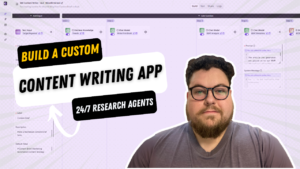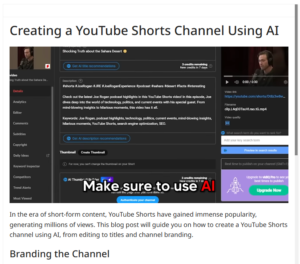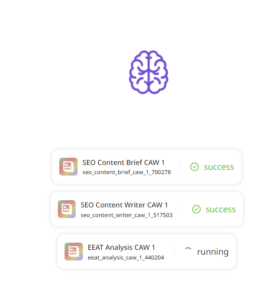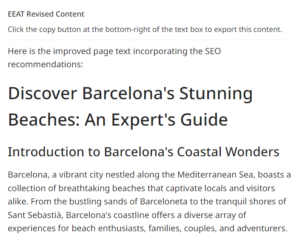This app creates SEO blog posts with a dash of information gain. It reads top-ranking web pages, brainstorms information gain ideas, writes the blog, and then improves it with EEAT and external links.
Try it here: SEO Blog Writer w/ Information Gain
How the app works:
- Enter a target keyword you want to make a blog post about
- Choose an output format (Markdown or HTML)
- Select a Tone of Voice and run it
- Wait about 5 minutes and enjoy a blog fresh from the LLM oven!
Example outputs:
This app produces much better content than your standard ChatGPT prompt or even custom GPTs that are out there.
Here’s an example of the keyword “best beaches in Bali” with an inspirational tone of voice:
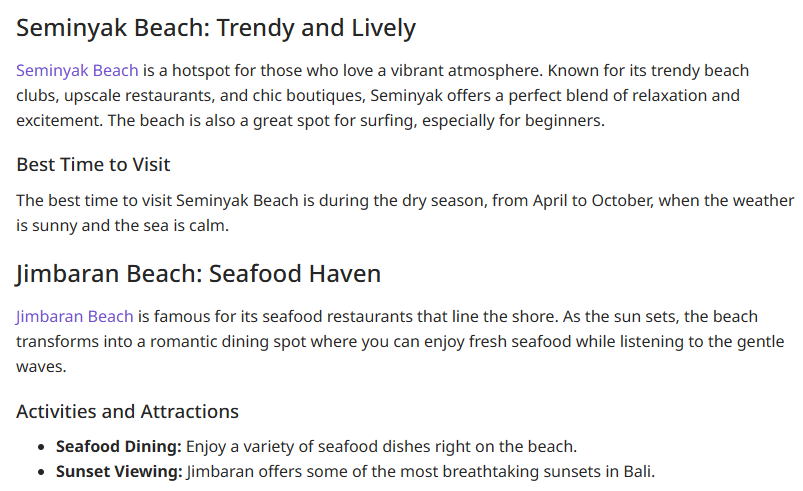
The app naturally linked to sources, explained why the beaches are a good choice, and included additional information like the best times to visit, or activities and attractions of particular beaches.
But that’s not all, it also included some unique information gain like the best beaches for snorkeling and diving. Which the top-ranking posts lack. It helps the blog stand out and be more unique:

Next up, here’s an output for the keyword “best cuts of steak” with a “detailed” tone of voice:
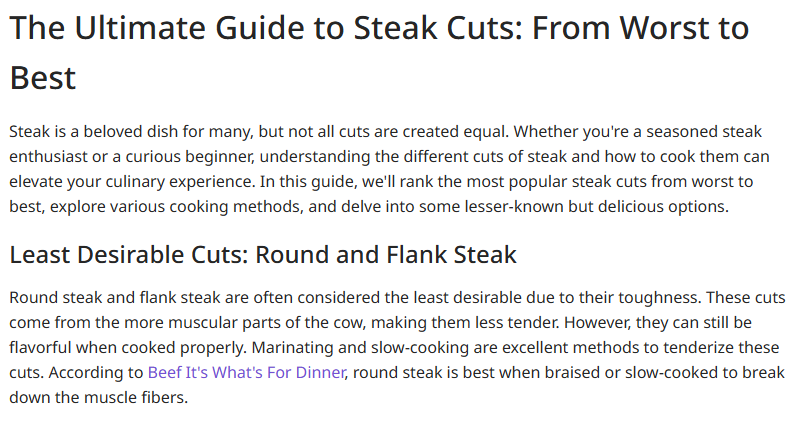
First up, it picked a unique angle for the article, ranking the beef cuts from worst to best, which is pretty cool.
Next, it includes plenty of external links to authoritative sources. In this example, I’d say there are far too many external links. I’d chop most of these out and just keep a few of the better ones. However, it’s a nice touch and a convenience.
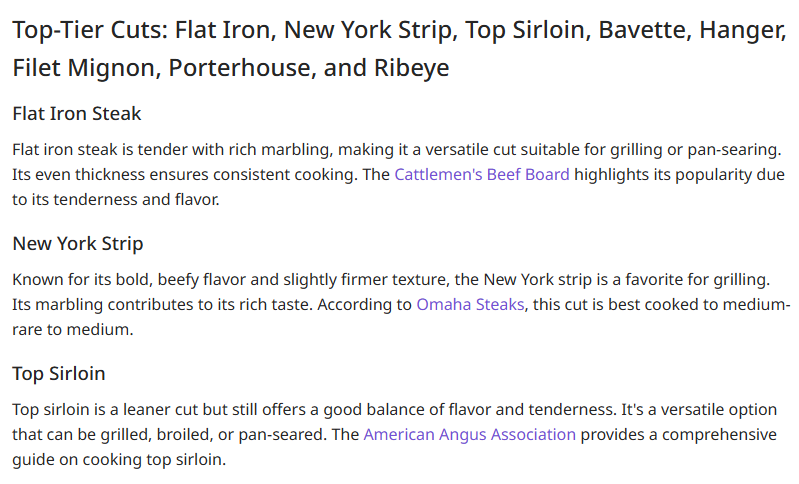
Finally, the output contained lots of unique information gain. From the importance of marbling, cooking methods, wet vs dry aging, the influence of breed and diet, lesser-known cuts, the role of temperature and resting time, and popular non-grilled steak options. This is great for SEO and a huge step up from prompts that merely write a random blog post.
What is information gain in SEO and why is it so important?
Information gain in SEO is a strategy that focuses on creating content that provides unique, valuable insights not found elsewhere. It’s crucial because it helps your content stand out in a saturated market, improves search engine rankings, and enhances user engagement. This approach is especially beneficial in an era where AI-generated content and copycat content are prevalent.
Flaws and limitations of the SEO content writer
This app is far from perfect. It’s no replacement for a skilled writer, and should only be used to get your creative juices flowing instead of replacing how you make content. Here are some of its key limitations:
- Limited web browsing: you can’t specify the country or location where the app browses the web to find information.
- Not great at external linking: The app attempts to do proper linking but it’s worth improving upon manually. It will provide too many links and pick random sources.
- It’s just an LLM: GPT 4 is great but still imperfect. It doesn’t know how to write engaging content for humans, but it tries its best.
- Too much information gain: It can provide a lot of supplementary content to the point where it gets a little random. Pick the best and chop the rest.
- Doesn’t optimize for specific keywords: I could add this feature, but I wanted to keep it simple.
What to do with your AI-generated content next
Whatever you do, don’t copy-paste and publish. Take some time to improve the content that this thing spits out. You can do this manually, or you can even use AI to improve it even more.
Here are some of the AI tools I’ve made specifically designed to improve SEO content:
- Mega EEAT Analysis App: Compare 3 pages against yours for EEAT improvements
- Google Quality Guideline Checker: Recommend helpful content guideline improvements
- Google Reviews Quality Checker: For “best of” type content affected by reviews algorithms
- EEAT Featured Snippet Generator: Makes featured snippet text (used above in the “why information gain matters section”)
- Automated Internal Linking Recommendations: Find relevant pages to add internal links to
- Automated Anchor Text Recommendations: Find anchor text and placement on other pages for adding internal links
- Anchor text improver: Improve the anchor text and context of surrounding internal links
- First-Hand Experience Finder: Find people who shared first-hand experiences about a thing
- Semantic Keyword Finder App: Find semantically related keywords to optimize with
Breakdown of how this app generates content:
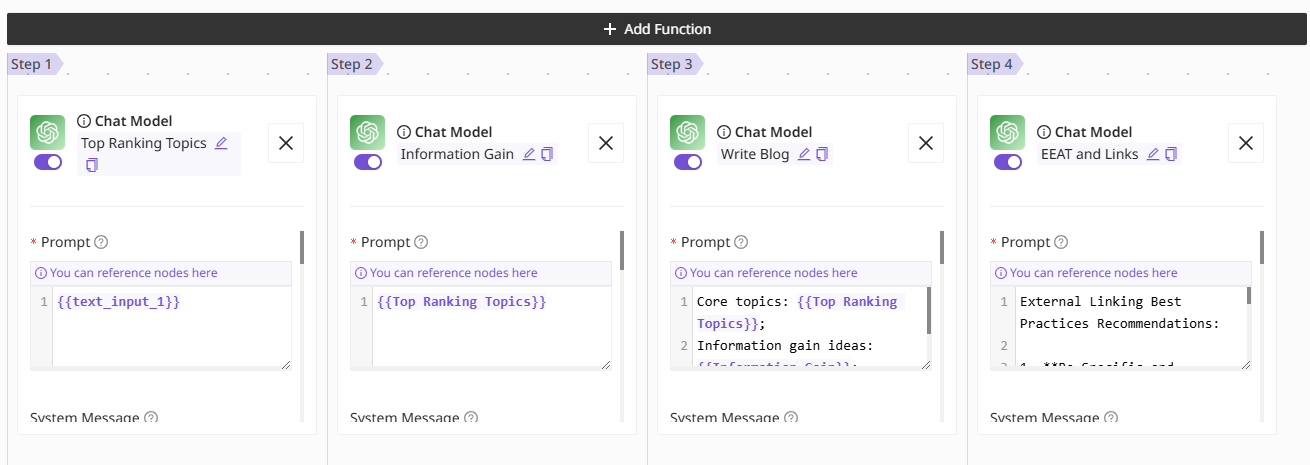
- Top Ranking Topics: Browses the web and reads the 5 top ranking articles for the keyword, summarize their topics and talking points.
- Information Gain: Brainstorm information and gain ideas not covered in the top 5 articles.
- Write the blog: Writes a blog that combines the structure and main talking points of all 5 articles, and incorporates information gain while reducing redundancies.
- EEAT and links: Takes a shot at adding external links and improving first-hand experience, expertise, authoritativeness, and trustworthiness.
You can’t replicate a content app like this with ChatGPT because it uses prompt chaining. You’ll need a more robust tool like Moonlit Platform, which is what this app was built with.
I chained together 4 different prompts, each with unique prompts, system messages, and dynamic variables. With a customizable tool like Moonlit, you can modify it however you like and add additional functionalities.
Join the AI SEO Academy
Want to learn how to use AI apps to streamline your SEO and content efforts? Join my AI SEO academy.
It’s a free group with 400+ members across the globe. You’ll get clone access to 30+ AI tools I’ve built so far.
I also include step-by-step video guides, courses on how to build the tools, and Notion templates.
